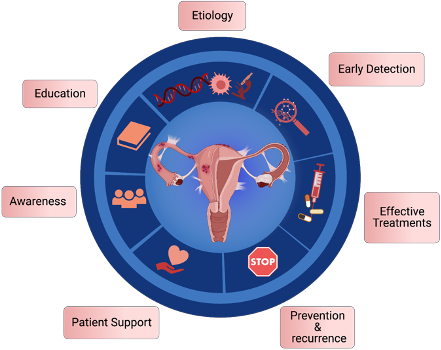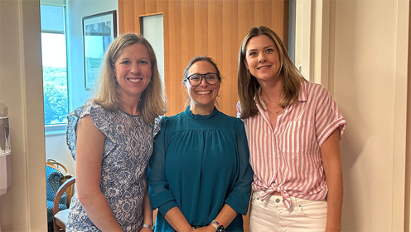Clinical and Tissue Biorepository & Research

EndoRISE program is the first public, multi-institution Data and Tissue Biorepository in the US that serves a pivotal role in research, aiming to deepen the understanding of endometriosis and spearheading advancements in its diagnosis, treatment and management.
Access to rare biological endometriosis samples provides researchers the ability to explore the genetic, molecular and environmental factors contributing to the disease. Through collaboration efforts, research findings are critical in the identification of novel biomarkers that may be key in early disease detection and development of targeted therapies.
EndoRISE aims to be a diverse and harmonized clinical data and tissue biobank, following the World Endometriosis Research Foundation efforts. We are committed to fostering collaboration among research and healthcare institutions, facilitating the seamless exchange of information, and ensuring that data collected from a broad spectrum of patients is uniformly structured and easily accessible. By standardizing clinical data, we aim to enhance the accuracy of research studies, accelerate the development of innovative treatments, and enable a more personalized approach to patient care.
Our goal is to empower researchers, clinicians, and patients with a rich repository of information and specimens that support the advancement of medical knowledge and the improvement of health outcomes for communities worldwide. Through dedication to data integrity, inclusivity, and interoperability, we strive to pave the way for a future where healthcare treatment for endometriosis is more efficient, effective, and equitable for all.
Establishing the Biorepository
Our efforts focus on inclusively representing the diversity of endometriosis cases across Connecticut (CT). We aim to curate biological samples of endometriosis from a diverse cross-section of communities in the state to ensure representation of all groups affected by endometriosis, including under-represented populations. This approach helps us better understand the condition's impact on different communities and improve care for all.

The EndoRISE program follows the guidelines established by the World Endometriosis Research Foundation (WERF) Endometriosis Phenome and Biobanking Harmonisation Project (EPHect) in order to standardize sample collection, processing and biobanking and enable large scale, cross center collaborative endometriosis research. EndoRISE is one of 60 centers worldwide that use EPHect tools. For more information on the guidelines and ePhect, you can visit the links provided below.
- ePhect (link)
- World Endometriosis Research Foundation Endometriosis Phenome and Biobanking Harmonisation Project: I. Surgical phenotype data collection in endometriosis research (link)
- World Endometriosis Research Foundation Endometriosis Phenome and biobanking harmonization project: II. Clinical and covariate phenotype data collection in endometriosis research (link)
- World Endometriosis Research Foundation Endometriosis Phenome and Biobanking Harmonization Project: III. Fluid biospecimen collection, processing, and storage in endometriosis research (link)
- World Endometriosis Research Foundation Endometriosis Phenome and Biobanking Harmonisation Project: IV. Tissue collection, processing, and storage in endometriosis research (link)





